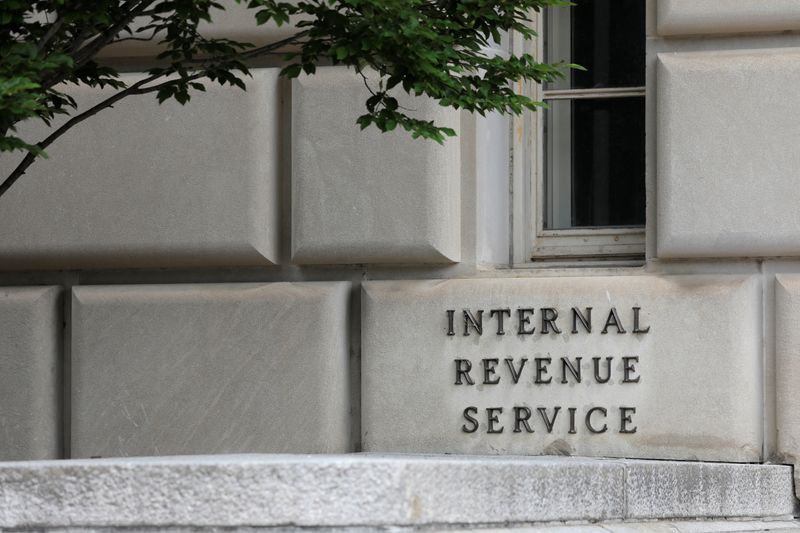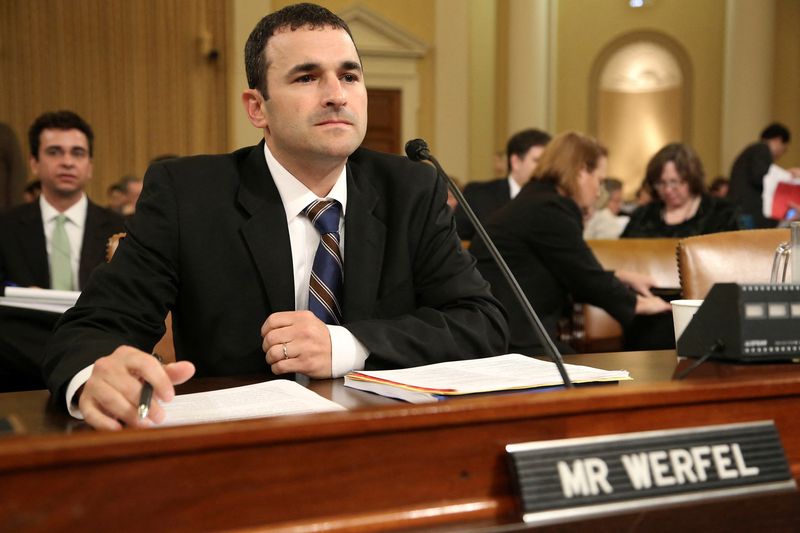(This April 6 story has been corrected to reflect an IRS clarification that full-time-equivalent hiring figures for FY 2024 are cumulative with FY 2023 figures, not in addition to FY 2023 figures)
By David Lawder
WASHINGTON (Reuters) - The U.S. Internal Revenue Service plans to hire nearly 20,000 new employees and deploy new technology over the next two years as it ramps up an $80 billion investment plan to improve tax enforcement and customer service, it said on Thursday .
The tax agency, in its long-awaited Strategic Operating Plan, said it will obligate about $8.64 billion of the new funding during the 2023 and 2024 fiscal years, and that 7,239 of the new hires during those years will be enforcement staff.
"The IRS is going to hire more data scientists than they ever have for enforcement purposes," U.S. Deputy Treasury Secretary Wally Adeyemo told reporters, adding that these would complement more traditional tax attorneys and revenue agents in using new data analytics technology to identify audit targets.
The IRS also will continue to ramp up customer service hiring after taking on 5,000 new taxpayer services staff in recent months to answer telephones, reopen taxpayer assistance centers and process tax returns.
Including those new employees, customer services hiring using the Inflation Reduction Act funding will total 6,489 full-time-equivalent staff over the two-year period, according to the 148-page plan.
But a significant portion of these new hires will replace the nearly 12,000 IRS employees expected to retire over the next two years -- including more than 4,700 enforcement staff, a U.S. Treasury official said.
The $80 billion in new funding from last year's climate-focused Inflation Reduction Act is aimed at rebuilding the agency's audit capabilities and 1960s-era computer technology after a decade of funding cuts mostly by Republican-controlled Congresses.
It also aims to help close the "tax gap" between taxes owed and those paid, estimated by Treasury at some $600 billion a year, by focusing new audits on the wealthiest Americans.
COMPLEX AUDITS
The IRS said $47.4 billion -- nearly 60% of the $79.4 billion worth of investments listed in the plan -- would be allocated toward expanded enforcement of "taxpayers with complex tax filings and high-dollar noncompliance."
Those audit targets include wealthy individuals, corporations and complex partnerships, which have grown in number while IRS audit staff has shrunk by nearly half over the past decade, new IRS Commissioner Danny Werfel told reporters.
Werfel said that the agency would soon provide hiring and spending plans for the 2025 fiscal year and would continually update the operating plan.
Tax experts say among the IRS' biggest challenges will be recruiting the tens of thousands of mid-career accountants, tax lawyers and other staff capable of handling complex audits amid tight labor market.
The IRS is devoting $12.4 billion to new technology and $4.3 billion to taxpayer services. Early changes will allow taxpayers to respond online to dozens of tax notices by the end of fiscal 2024.
REPUBLICAN BACKLASH
The plan drew fresh complaints from Republicans who want to repeal the IRS funding as part of their demands for raising the $31.4 trillion federal debt ceiling.
Senator Steve Daines, a Montana Republican, said the IRS "plans to deploy an army of tens of thousands of IRS agents to increase audits on Montana families and reach into the pocketbooks of Americans."
Werfel sought to debunk erroneous Republican claims that the funding will create an army of 87,000 armed agents to harass Americans on their taxes. He said that the percentage of Criminal Investigation staff would not change from its current proportion of about 3% of the IRS workforce.

Only about 2,100 Special Agents in the Criminal Investigation unit are authorized to carry firearms, according to a Reuters Fact Check
The new IRS chief, said that he would enforce Treasury Secretary Janet Yellen's pledge to not increase historical audit rates for Americans earning under $400,000 and would base this on "historically low" 2018 audit rates.
